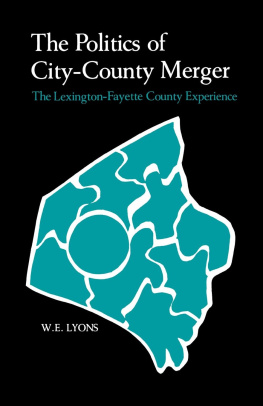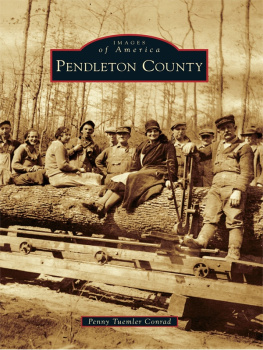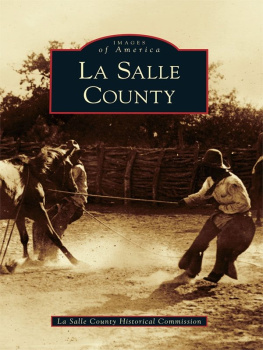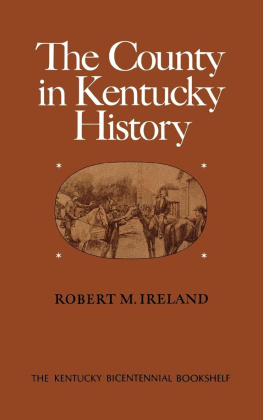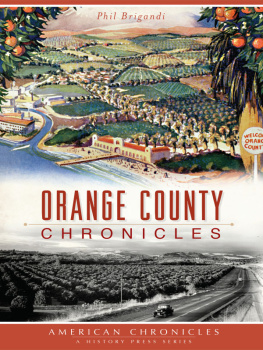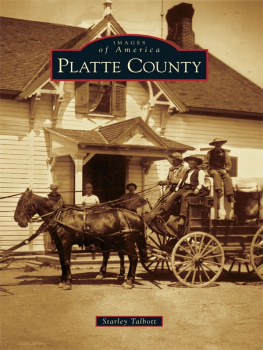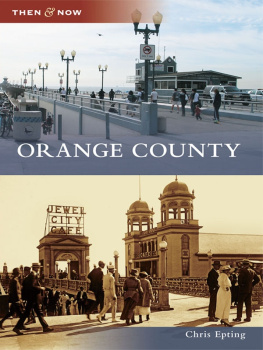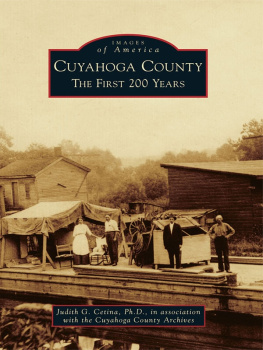The Politics of City-County Merger
The Politics of
City-County Merger
The Lexington-Fayette County Experience
W. E. Lyons
ISBN: 978-0-8131-5333-9
Library of Congress Catalog Card Number: 77-73706
Copyright 1977 by The University Press of Kentucky
A statewide cooperative scholarly publishing agency
serving Berea College, Centre College of Kentucky,
Eastern Kentucky University, The Filson Club,
Georgetown College, Kentucky Historical Society,
Kentucky State University, Morehead State University,
Murray State University, Northern Kentucky University,
Transylvania University, University of Kentucky,
University of Louisville, and Western Kentucky University.
Editorial and Sales Offices: Lexington, Kentucky 40506
Preface
THE POLITICS OF CITY-COUNTY MERGER is a study of the initiation, development, and eventual adoption of a proposal to consolidate the governments of the city of Lexington and Fayette County, Kentucky. It is also a study of how the Lexington experience squares with consolidation efforts in other communities since World War II.
It must be noted at the outset, however, that much of what follows is based on information I gathered while serving as a direct participant in the initiation and development of the Lexington merger proposal and as a consultant-participant during the campaign to secure voter approval of that proposal. I was a member of the small group of citizens who initiated and conducted the petition drive to get the city and county governments to establish a merger commission to develop a comprehensive plan or charter under the provisions of the state enabling statute. I was subsequently appointed to the merger commission and elected its chairman. Following the completion of the charter, I served as a consultant to a committee that was formed to conduct the referendum campaign, and I was an active spokesman for the proposed charter throughout the campaign.
Although this afforded me an opportunity to observe firsthand many of the nuances of the consolidation process, there should be no misunderstanding about where I stood on the question of merging city and county governments in Lexington. I hope that my training and experience as a political scientist specializing in the study of urban government and politics provides a reasonable counterbalance to the passion that goes with being an advocate for a particular point of view.
I wish to thank several people for their support and encouragement during both the merger process in Lexington and the writing of this study. I would like to offer special thanks to former Fayette County Judge Robert Stephens, who is currently the attorney general of Kentucky, for supporting merger from the outset and remaining a true friend of merger even after the charter commission decided to eliminate the executive and administrative powers that traditionally belonged to the office of county judge in Fayette County. Similarly, I wish to express my deepest gratitude to H. Foster Pettit, who became mayor of the city of Lexington at a very crucial point in the local city-county consolidation process. Without his cooperation as mayor, this volume on the success of the Lexington merger effort might not have been possible.
A special note of gratitude is also extended to the members of the Lexington-Fayette County Merger Commission for their tacit willingness to allow the author to retain the records and tape recordings of the proceedings of the commission and its various committees throughout the writing of this study. I also wish to thank various members of the commission for their cooperation in trying to clarify for me the meaning and substance of their remarks not clearly evident from either the tapes or written records of their deliberations.
Finally, I would like to express my gratitude to Penrose Ecton, Steve Driesler, and Dianne Smith who kept the author fully informed about the details surrounding the campaign phase of the Lexington merger effort. As leaders of the promerger campaign organization called the Committee to Insure Good Government, they were invaluable to the completion of this study. Penrose Ecton, who officially headed this group, passed away shortly after the Lexington merger charter was adopted. I would, therefore, like to dedicate this study to hima true gentleman and ardent supporter of city-county consolidation in the Lexington area.
I
Introduction
ON NOVEMBER 7, 1972, the voters of Lexington and Fayette County, Kentucky, decided by a rather substantial margin to consolidate their city and county governments into a single, unified, urban county government. From a strictly local perspective, the implications of this decision were of profound historical and political import. But there were more than local considerations at stake as the voters of this community responded to the merger question. They were participating in one of the most widely discussed reform movements in the history of the United States. Whatever their individual choices on the matter, the voters of Lexington and Fayette County were helping to write another chapter in the long and often contentious history of city-county consolidation.
Although much has been written on the subject, those interested in studying city-county consolidation have encountered several major difficulties. One problem has been that, while many communities have discussed the idea, relatively few have ever reached the point of making a final, authoritative decision on the matter. Furthermore, the opportunities we have had to examine the total consolidation process have been spread over several decades and have occurred in widely scattered places.
Given these problems, it is not surprising that much of the existing literature on the subject consists of little more than narrative accounts of the consolidation process in particular communities. Case studies of this type are always useful, but they rarely contribute much toward the development of a more systematic body of knowledge about the city-county consolidation process in general.
The problems associated with the study of city-county consolidation have also affected researchers interested in developing a more systematic, comparative approach to the subject. The difficulty of studying consolidation efforts in widely scattered places and times has led most researchers to focus on the stage in the total process that is most amenable to systematic analysisvoter reactions to consolidation proposals based on available aggregate data. Official election returns are readily available for consolidation referenda, and there is little difficulty in obtaining information about the social and economic traits of people living in various communities from the United States Census.

